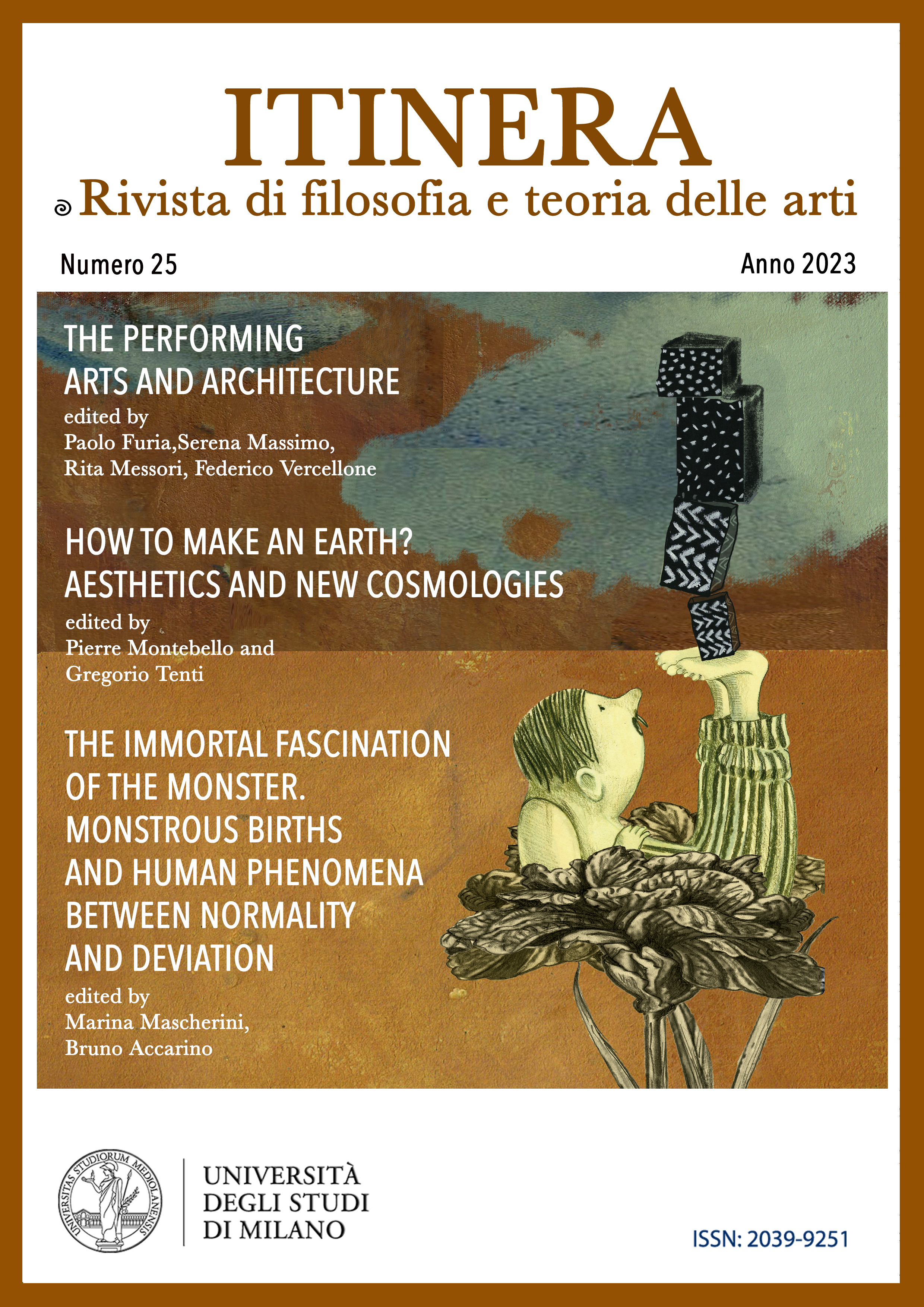Monst[her]-Making and Dina: Looking at the Creation of the Monstrous Feminine Through the Lens of Derrida’s Différance
DOI:
https://doi.org/10.54103/2039-9251/20839Parole chiave:
Monster, Differance, Othering, FeminismAbstract
Man has often written about the creation of the monster. The monstrous figure frequently appears in a way that differentiates itself from the human by its grotesqueness, its potential immortality, and/or, of course, its desire to defile the body of the human (i.e. zombies, vampires, etc.) This trauma–i.e. that of being other than human–is often categorized as wicked and wrong. In the case of Attack on Titan, there is a deviation from the norm–namely, instead of being seen as merely evil, these monsters are seen as some“one” to sympathize with. Attack on Titan forces us to question the blurry line that is used to divide monster from human,and forces the viewer to question the human condition of the demonized and repressed everyday "monsters."
It is our claim that Dina Fritz works as a representation of “monster.” We look at Dina as an example of representative trauma inflicted through horrific events–such as a genocidal war, dehumanization, and, of course, forced bodily violation–and how these traumas create the beasts that lead to such events; i.e. making these “monst[hers]” out of humans. We argue that the characterization of Dina Fritz is a warning to its audience that segregation, violence, and the loss of bodily autonomy perpetuates a cycle of monstrous births/creation. In this article, we will speak not only to the end result of the monstrous creation–i.e. the monst[her]–but also to the line that has been blurred with this monstrous other and the human in the world of Attack on Titan.
Downloads
Riferimenti bibliografici
Brinkhof, T., Revisiting the Fascist Subtext of Attack on Titan: Some Notes on a Modern Reactionary Anime, 2021, p. 22.
Cassese, E., Partisan Dehumanization in American Politics, 2019, p. 29.
De Beauvoir, S., The Second Sex, NRF essais (in French), in “Les faits et les mythes”, Vol. 1, (Facts and Myths), 1949.
Derrida, J., Speech and Phenomena and Other Essays on Hesserl’s Theory of Signs, trans. David B. Allison, Evanstong: Northwestern University Press ,1997.
Esmeir, S., On Making Dehumanization Possible, 2020, p. 1549.
Hemadeh, R., Attack on Titan and the Hunger Games: Dystopias with an Orwellian Foundation, 2022, p. 28.
Isayama, H., Writer and Director, Attack on Titan: Chapter 125, p. 6.
Isayama, H., Writer and Director, Attack on Titan, Season 1, Episode 1, “To You, 2,000 Years in the Future -The Fall of Zhiganshina,” 20:23-23:27.
Isayama, H., Writer and Director, Attack on Titan, Season 3, Episode 57, “That Day,” 8:34-9:42.
Isayama, H., Writer and Director, Attack on Titan, Season 4, Episode 62, “The Door of Hope,” 14:00-14:13.
Isayama, H., Writer and Director, Attack on Titan, Season 4, Episode 80, “From You, 2,000 Years Ago,” 08:18-08:50.
Kteily N., and E. Bruneau, Backlash: The Politics and Real-World Consequences of Minority Group Dehumanization, 2017, pp. 101-102.
Morgan, R., Sisterhood is Powerful, 1970.
Schultz, W., L. Fried, Jacques Derrida Bibliography, London & New York: Garland, 1992, p. 12.
Tatum, S., Eric Trump: Democrats in Washington Are ‘not Even People’ | CNN Politics, CNN, 7 June 2017.
https://www.cnn.com/2017/06/07/politics/eric-trump-hannity-democrats-obstruction/index.html.
The Editors of The Encyclopædia Britannica, Jacques Derrida, in “Encyclopædia Britannica”, 2023. https://www.britannica.com/biography/Jacques-Derrida#ref748407.
Dowloads
Pubblicato
Versioni
- 2023-10-20 (2)
- 2023-08-08 (1)
Come citare
Fascicolo
Sezione
Licenza
Copyright (c) 2023 Kaitlyn Samons, Justin Shay Easler

Questo lavoro è fornito con la licenza Creative Commons Attribuzione - Condividi allo stesso modo 4.0.
Gli autori che pubblicano su questa rivista accettano le seguenti condizioni:
1. Gli autori mantengono i diritti sulla loro opera e cedono alla rivista il diritto di prima pubblicazione dell'opera, contemporaneamente licenziata sotto una Licenza Creative Commons - Attribuzione - Condividi allo stesso modo 4.0 internazionale che permette ad altri di condividere l'opera indicando la paternità intellettuale e la prima pubblicazione su questa rivista.
2. Gli autori possono aderire ad altri accordi di licenza non esclusiva per la distribuzione della versione dell'opera pubblicata (es. depositarla in un archivio istituzionale o pubblicarla in una monografia), a patto di indicare che la prima pubblicazione è avvenuta su questa rivista.
3. Gli autori possono diffondere la loro opera online (es. in repository istituzionali o nel loro sito web) prima e durante il processo di submission, poiché può portare a scambi produttivi e aumentare le citazioni dell'opera pubblicata (Vedi The Effect of Open Access).





